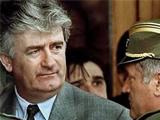 The case against the wartime Bosnian Serb leader is not what it should have been, and the Hague Tribunal will be forced to end its mandate with an entertaining farce, Anes Alic comments for ISN Security Watch.
The case against the wartime Bosnian Serb leader is not what it should have been, and the Hague Tribunal will be forced to end its mandate with an entertaining farce, Anes Alic comments for ISN Security Watch.
Though many had doubts that wartime Bosnian Serb leader Radovan Karadzic would ever be arrested and extradited to The Hague, the Bosnian public at least expected that once he was apprehended, he would be tried expediently, and the case would finally be closed.
The idea was that when Karadzic was arrested on a Belgrade bus in July last year after more than 13 years on the run, the prosecution of the Hague-based International Criminal Tribunal for the former Yugoslavia (ICTY) would hit him with the mounds of evidence they had been collecting ever since he was first indicted in 1995 and that this would be enough.
Not so.
It seems that while on the run – and during his interim breaks as a practitioner of alternative medicine in Serbia – Karadzic had plenty of time to plan his defense. His strategy includes stunts to ensure delays, denials, counter accusations and attempts to turn the entire affair into a political circus. And the ICTY has been snared.
It has been over 10 months since Serbian secret police arrested and extradited Karadzic. His trial, for 11 charges of war crimes and crimes against humanity, including genocide, has not yet started.
Though other ICTY trials have experienced long delays, for Karadzic, this should not have been the case. Not only because he was the most wanted war criminal in Europe for more than a decade, and not only because the prosecution had 13 years to collect evidence, but also because the ICTY’s mandate is supposed to expire at the end of this year.
The UN Security Council, which established the court in 1995, has asked that the cases be completed as soon as possible, and the ICTY is scheduled to begin downsizing in 2010 after holding full trials this year for some of the remaining six cases.
Karadzic’s trial is to be the last for the Tribunal unless wartime Bosnian Serb general Ratko Mladic and former Croatian Serb rebel leader Goran Hadzic are apprehended in time. Karadzic is taking full advantage of the fact that the ICTY will soon have to shut its doors and that his trial is expected to last for over two years.
So far, Karadzic is combining the defense tactics of former Serbian deputy prime minister and paramilitary leader Vojislav Seselj and former Serbian president Slobodan Milosevic: the most effective being refusing to enter a plea, vowing to serve as his own defense and challenging the court’s legitimacy.
Turning The Hague stage into a political show, Karadzic has claimed that Bosnian Serbs were defending their fatherland from Muslim and Croat attacks and that the latter were operating on orders from western powers, primarily the US, to break up Yugoslavia.
Central to his delay tactics is the claim that in 1996 US diplomat Richard Holbrooke offered him immunity from prosecution in return for quitting public life. Holbrooke denies this.
Karadzic claims that after details of the alleged deal were made public, he learned of western assassination plots against him and as such could not have surrendered to the ICTY.
“I must say that this is a matter of life and death. If Mr Holbrooke still wants my death […] I wonder if his arm is long enough to reach me here,” Karadzic said in his first Hague appearance last year.
Karadzic has summoned former international envoy in Bosnia and current Swedish Foreign Minister Carl Bildt to serve as a witness to his claims. Bildt declined the invitation, saying he had nothing relevant to add to the case.
ICTY judges had earlier dropped a motion to suspend the trial and dismiss the indictment on this basis, saying that the alleged Holbrooke agreement had nothing to do with the court; but rest assured that the issue will surface again.
At his first court appearance, Karadzic submitted nearly 100 pretrial motions and briefs, and more than 300 letters and responses – a record in ICTY history.
When his trial finally starts, perhaps in late August, Karadzic will use the court as a platform to portray the war in Bosnia in a different light, and those who support him and see him as a hero will enjoy the show, broadcast on public television across the former Yugoslavia. A brilliant and charismatic orator, he will use this opportunity to his greatest advantage. Justice will be slow, but entertainment will be hard and fast.
Source: isn.ethz.ch
 Eurasia Press & News
Eurasia Press & News